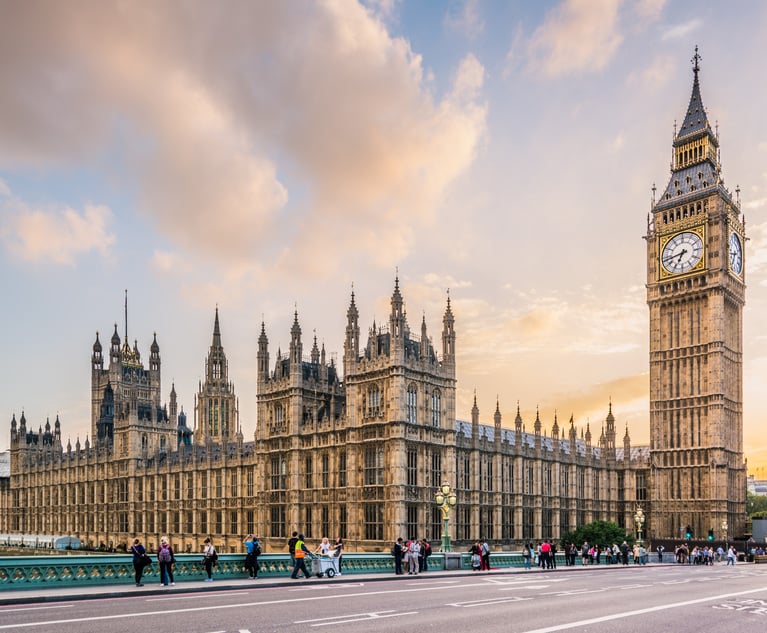NY Law Firms Aren't Rushing Back to Offices Even If Their Clients Are
Reopening dates in New York, if they are set, are tentative or limited to a select few. Meanwhile, some clients are heading back to offices more quickly.
July 02, 2020 at 05:27 PM
6 minute read
The original version of this story was published on New York Law Journal
 Midtown Manhattan, New York. Photo: Ryland West
Midtown Manhattan, New York. Photo: Ryland West
Big law firms remain cautious about having lawyers and staff return to offices in Manhattan, with some firms such as Latham & Watkins and Shearman & Sterling planning to allow some personnel to return to New York offices this month. Meanwhile, other firms remain uncommitted to any timeline before Labor Day.
These decisions come as many of New York-based financial service clients head back to the office in bigger numbers, according to a recent survey conducted by Seward & Kissel.
New York City law firms were allowed to reopen their offices, with limited capacity, as of June 22. Some Manhattan lawyers returned to offices then, but many didn't. While there are solid benefits to working alongside colleagues, the risk of working in offices, including the commute and the unpredictability of outbreaks, has kept many lawyers at home.
Concerns remain that outbreaks in the South and West may spread to New York, which was once the epicenter of U.S. cases, while small outbreaks in New York City suburbs are erupting near many commuters' homes.
For these reasons, reopening dates, if they are set, are tentative or limited to a select few.
In a statement, Shearman & Sterling said starting July 6, "a limited number of personnel" who can't effectively work remotely "will have access to our New York City office on a voluntary basis in a rotating team structure."
"We are encouraging everyone to continue to work remotely unless it is necessary and essential for them to enter the office," Shearman said. "The safety of our people and those around them remains our main priority. We have strict guidance in place to help people access the workplace safely, and we continue to monitor the situation closely. We continue to provide our clients with excellent service, while maintaining business continuity across the firm. "
Meanwhile, Sherman said it does not anticipate requiring attendance in the office until at least after Labor Day.
"As communities around the world continue to manage the impact of COVID-19 and navigate how to reopen, we are formulating our plans to return to the firm's offices," said David Beveridge, a senior partner, in a statement. "We have a global approach to returning to our offices that incorporates the needs of each location. We are now at the stage where specific offices in some jurisdictions are returning to the workplace. In all of these plans, the health and well-being of our people, their families and our clients remain of paramount importance."
Latham & Watkins plans to reopen its Manhattan office later this month, but not before July 20, using a voluntary and gradual approach, along with masks and social distancing.
"As localities enter new phases of opening, we will begin the process to allow our personnel to gradually return to the office with appropriate precautions, including physical distancing, the use of masks, and limiting the numbers of individuals in the office at any given time," a Latham representative said. "We continue to closely watch the evolving situation with the safety of our people and clients as our first priority," the representative said, adding the firm has been "fully engaged in serving our clients and the business of the firm" in remote operations.
Similarly, a representative with Stroock & Stroock & Lavan said the firm's current plan is to reopen on July 27 "with minimal numbers to test out protocols." Additional staff could return after Labor Day, the firm said.
Law.com has previously reported that Willkie Farr & Gallagher, Pryor Cashman and Sidley Austin had set tentative reopen dates in Manhattan this summer, while Morrison Cohen chose to reopen its office with limited capacity on June 22 on a voluntary basis.
For its part, a Fried, Frank, Harris, Shriver & Jacobson spokeswoman said the firm was not opening its offices before Labor Day. The firm is "monitoring local guidelines and updates to determine a more specific reopen date that prioritizes the health and safety of the Fried Frank community," the spokeswoman said, adding the firm continued to provide clients with uninterrupted service.
But many big firms, such as Proskauer Rose, haven't yet set a reopening date in New York. "We will introduce a phased return-to-work plan across all of our offices over the next several weeks," a representative confirmed Wednesday, "so that our people can safely work in the office and are able to keep socially distanced."
Client offices
The legal industry may be less ambitious about returning to offices than some of its financial service clients.
New York midsized firm Seward & Kissel surveyed managers of hedge funds, private equity funds and other alternative investment vehicles, receiving responses in June from about 150 fund managers about when they planned to return to their offices.
According to the survey results, 61% of respondents said they believe that up to half of their firms' workforce will return to the office by September. And nine in 10 New York City respondents believed that half of their workforce will return to the office by year-end.
"People are somewhat ambitious," said Steve Nadel, a Seward partner who was lead author of the study, noting that financial service professionals, like others, "have been working from home since March and while I think the [fund] industry has been successful in pivoting to remote technology, clearly there are some reasons that people want to be in the office."
That includes preserving workplace culture and more ease in collaborating on teams, supervising employees and training personnel, he said.
But Nadel said he doesn't think any push by financial service clients to return to offices would influence their attorneys to return faster. "It's extremely rare for a client to say we must meet in person," Nadel said about experiences in his own practice.
"I've been operating extremely efficiently from home," Nadel said. "We're not going to be making our decision on when we physically open based on when clients reopen," Nadel said about his own firm's reopening. "There's a myriad of factors that need to be considered when reopening."
Nadel also noted the difficulty for all employers to stock up with supplies. "We're ordering thousands and thousands of masks and gloves and sanitizer, and we're competing with everyone else who is ordering the same stuff," Nadel said. "It's a big undertaking, and you want to do it right, and you want to do it carefully."
Demographics may factor into when different industries return to their offices. For instance, many hedge fund staff are in their 30s and 40s and are living in the city, Nadel noted, while many lawyers who work in Manhattan tend to live in the suburbs and are older. "Those demographic factors play into it," Nadel said.
Patrick Smith and Samantha Stokes contributed to this report.
This content has been archived. It is available through our partners, LexisNexis® and Bloomberg Law.
To view this content, please continue to their sites.
Not a Lexis Subscriber?
Subscribe Now
Not a Bloomberg Law Subscriber?
Subscribe Now
NOT FOR REPRINT
© 2025 ALM Global, LLC, All Rights Reserved. Request academic re-use from www.copyright.com. All other uses, submit a request to [email protected]. For more information visit Asset & Logo Licensing.
You Might Like
View All
Malaysia’s Shearn Delamore Set To Expand Local Footprint With New Office Launch


CMA Uses New Competition Powers to Investigate Google Over Search Advertising

‘A Slave Drivers' Contract’: Evri Legal Director Grilled by MPs
Law Firms Mentioned
Trending Stories
- 1Courts Grapple With The Corporate Transparency Act
- 2FTC Chair Lina Khan Sues John Deere Over 'Right to Repair,' Infuriates Successor
- 3‘Facebook’s Descent Into Toxic Masculinity’ Prompts Stanford Professor to Drop Meta as Client
- 4Pa. Superior Court: Sorority's Interview Notes Not Shielded From Discovery in Lawsuit Over Student's Death
- 5Kraken’s Chief Legal Officer Exits, Eyes Role in Trump Administration
Who Got The Work
J. Brugh Lower of Gibbons has entered an appearance for industrial equipment supplier Devco Corporation in a pending trademark infringement lawsuit. The suit, accusing the defendant of selling knock-off Graco products, was filed Dec. 18 in New Jersey District Court by Rivkin Radler on behalf of Graco Inc. and Graco Minnesota. The case, assigned to U.S. District Judge Zahid N. Quraishi, is 3:24-cv-11294, Graco Inc. et al v. Devco Corporation.
Who Got The Work
Rebecca Maller-Stein and Kent A. Yalowitz of Arnold & Porter Kaye Scholer have entered their appearances for Hanaco Venture Capital and its executives, Lior Prosor and David Frankel, in a pending securities lawsuit. The action, filed on Dec. 24 in New York Southern District Court by Zell, Aron & Co. on behalf of Goldeneye Advisors, accuses the defendants of negligently and fraudulently managing the plaintiff's $1 million investment. The case, assigned to U.S. District Judge Vernon S. Broderick, is 1:24-cv-09918, Goldeneye Advisors, LLC v. Hanaco Venture Capital, Ltd. et al.
Who Got The Work
Attorneys from A&O Shearman has stepped in as defense counsel for Toronto-Dominion Bank and other defendants in a pending securities class action. The suit, filed Dec. 11 in New York Southern District Court by Bleichmar Fonti & Auld, accuses the defendants of concealing the bank's 'pervasive' deficiencies in regards to its compliance with the Bank Secrecy Act and the quality of its anti-money laundering controls. The case, assigned to U.S. District Judge Arun Subramanian, is 1:24-cv-09445, Gonzalez v. The Toronto-Dominion Bank et al.
Who Got The Work
Crown Castle International, a Pennsylvania company providing shared communications infrastructure, has turned to Luke D. Wolf of Gordon Rees Scully Mansukhani to fend off a pending breach-of-contract lawsuit. The court action, filed Nov. 25 in Michigan Eastern District Court by Hooper Hathaway PC on behalf of The Town Residences LLC, accuses Crown Castle of failing to transfer approximately $30,000 in utility payments from T-Mobile in breach of a roof-top lease and assignment agreement. The case, assigned to U.S. District Judge Susan K. Declercq, is 2:24-cv-13131, The Town Residences LLC v. T-Mobile US, Inc. et al.
Who Got The Work
Wilfred P. Coronato and Daniel M. Schwartz of McCarter & English have stepped in as defense counsel to Electrolux Home Products Inc. in a pending product liability lawsuit. The court action, filed Nov. 26 in New York Eastern District Court by Poulos Lopiccolo PC and Nagel Rice LLP on behalf of David Stern, alleges that the defendant's refrigerators’ drawers and shelving repeatedly break and fall apart within months after purchase. The case, assigned to U.S. District Judge Joan M. Azrack, is 2:24-cv-08204, Stern v. Electrolux Home Products, Inc.
Featured Firms
Law Offices of Gary Martin Hays & Associates, P.C.
(470) 294-1674
Law Offices of Mark E. Salomone
(857) 444-6468
Smith & Hassler
(713) 739-1250








